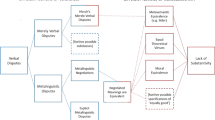Abstract
Philosophers readily talk about merely verbal disputes, usually without much or any explicit reflection on what these are, and a good deal of methodological significance is attached to discovering whether a dispute is merely verbal or not. Currently, metaphilosophical advances are being made towards a clearer understanding of what exactly it takes for something to be a merely verbal dispute. This paper engages with this growing literature, pointing out some problems with existing approaches, and develops a new proposal which builds on their strengths.
Similar content being viewed by others
Notes
Thanks to Matthew Kennedy for help with this point.
Of course, neither (i) nor (ii) is presented as giving a sufficient condition, but since we are in search of one we would do well to consider the respects in which these conditions fail to be such.
In fact, this is a case to which I think the phrase ‘merely verbal dispute’ is applicable in some contexts but not others. See §5 below for more details.
NB: I’m not here defending this sort of supposition about sceptics and their opponents.
Thanks to David Chalmers for suggesting that I discuss this strategy.
I say ‘presenting’ because it is not clear to me that Manley intends to endorse this proposal.
This by itself does not quite settle things: if (for example) we were externalists of the right kind about belief contents, inspired perhaps by Burge 1979, we might end up thinking that what a person believes is very closely tied to what his utterances mean in a public language. So I should also specify that in this passage I am taking belief contents to be individuated in way that is much more closely related to the utterer’s meaning of the subject’s utterances than the public-language meaning of those utterances. (Actually, I tend towards the view that there are many notions of ‘content’ applicable to beliefs, and that these are just two of them.) Thanks to David Chalmers and Matthew Kennedy for discussion of this point.
Cf. Chalmers’s discussion of ‘vocabulary exhaustion’, 2011, p. 530).
See, for example, Hirsch 2009, p. 239.
That still leaves open the possibility that the other conditions are not met. For example, there could be a prima facie dispute consisting in the trading of meaningless words where the appearance of disagreement is created by means other than divergent uses of language. Thanks to Jonathan Schaffer for getting me thinking about these cases.
I am grateful to my audience at the University of St Andrews here.
This is not to deny that there is room for further improvement in MVD through getting clearer still about what kinds of explanation are supposed to be signaled by the explanation-marker phrase ‘owing to’ in MVD. As it stands, there could still be cases, somewhat analogous to the Fred/Freda case, where there is some strange explanatory connection between the parties’ divergent use of language and the appearance of disagreement between them, but where we don’t want to conclude that the parties are having a merely verbal dispute. However, we have at least made progress by ruling out some of the more immediate problems of this kind.
Thanks to an anonymous Erkenntnis referee for pressing this worry this way.
Thanks to Pekka Väyrynen for suggesting I consider pejoratives in this connection.
Thanks to Daniel Nolan for help with this example.
We shouldn’t require that the participants in a merely verbal dispute need to believe that they are disagreeing. For one thing, they might just fail to be sufficiently reflective to believe this.
References
Bennett, K. (2009). Composition, colocation, and metaontology. In D. Chalmers, D. Manley, & R. Wasserman (Eds.), Metametaphysics (pp. 38–76). Oxford: Oxford University Press.
Burge, T. (1979). Individualism and the Mental. Midwest Studies in Philosophy, 4, 73–121.
Chalmers, D. (2011). Verbal disputes. Philosophical Review, 120, 515–566.
Eklund, M. (2009). Carnap and ontological pluralism. In D. Chalmers, D. Manley, & R. Wasserman (Eds.), Metametaphysics (pp. 130–156). Oxford: Oxford University Press.
Grice, H. P. (1968). ‘Utterer’s Meaning. Sentence Meaning, and Word Meaning’, in Foundations of Language, 4, 225–242.
Grice, H. P. (1969). Utterer’s meaning and intentions. Philosophical Review, 68, 147–177.
Hirsch, E. (2005). Physical-object ontology verbal disputes, and common sense. Philosophy and Phenomenological Research, 70, 67–98.
Hirsch, E. (2009). Ontology and alternative languages. In D. Chalmers, D. Manley, & R. Wasserman (Eds.), Metametaphysics (pp. 231–259). Oxford: Oxford University Press.
Laurence, S., & Margolis, E. (2006). Concepts. In Stanford encyclopedia of philosophy. Available at: http://www.seop.leeds.ac.uk/entries/concepts/.
Lewis, D. (1988). Statements partly about observation. In his Papers in philosophical logic (pp. 125–155). Cambridge: Cambridge University Press.
Manley, D. (2009). Introduction. In D. Chalmers, D. Manley, & R. Wasserman (Eds.), Metametaphysics (pp. 1–37). Oxford: Oxford University Press.
O’Connor, D. (2001). Routledge philosophy guidebook to Hume on religion. London: Routledge.
Ridge, M. (2008). Moral non-naturalism. In Stanford encyclopedia of philosophy. Available at: http://www.seop.leeds.ac.uk/entries/moral-non-naturalism/.
Schwitzgebel, E. (2006). Belief. In Stanford encyclopedia of philosophy. Available at: http://www.seop.leeds.ac.uk/entries/belief/.
Sider, T. (2006). Quantifiers and temporal ontology. Mind, 115, 75–97.
Swan, K. (2006). A Metaethical option for theists. Journal of Religious Ethics, 34, 3–20.
Acknowledgments
I would like to thank an audience at the University of Leeds, especially Elizabeth Barnes, Ross Cameron, Daniel Elstein, Jason Turner, Pekka Varynen and Robert Williams; an audience at the University of Nottingham, especially Peter King, Matthew Kennedy and Stephen Mumford; and an audience at the University of St Andrews, especially Herman Cappelen, Tamar Gendler and Jonathan Schaffer. I am also grateful to the anonymous referees who commented on versions of this paper, and to David Chalmers and especially Daniel Nolan for detailed comments and discussion.
Author information
Authors and Affiliations
Corresponding author
Rights and permissions
About this article
Cite this article
Jenkins, C.S.I. Merely Verbal Disputes. Erkenn 79 (Suppl 1), 11–30 (2014). https://doi.org/10.1007/s10670-013-9443-6
Received:
Accepted:
Published:
Issue Date:
DOI: https://doi.org/10.1007/s10670-013-9443-6




